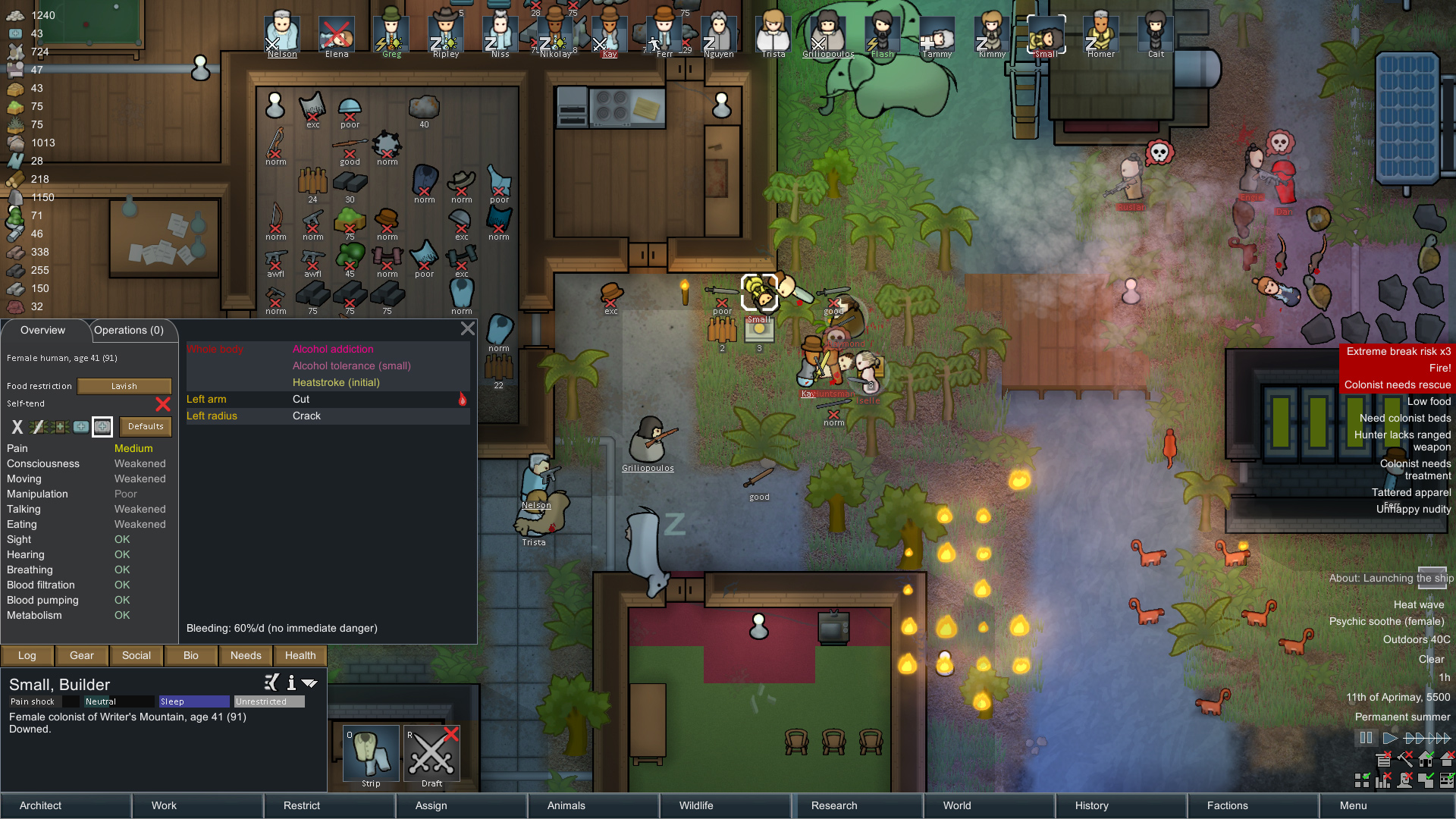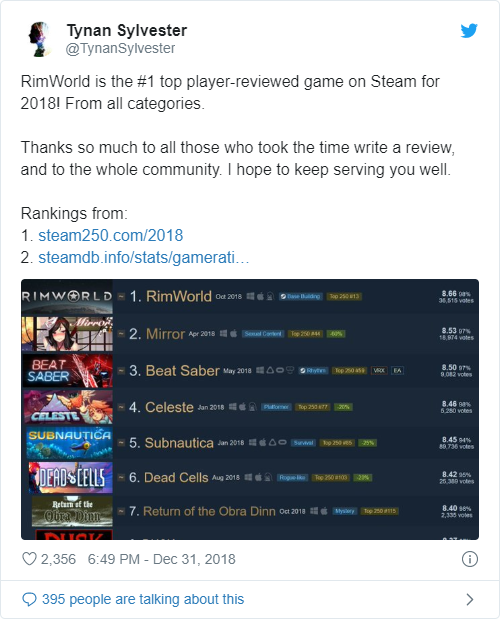“An EXPERIENCE is an arc of emotions, thoughts, and decisions inside the player’s mind.”
― Designing Games: A Guide to Engineering Experiences
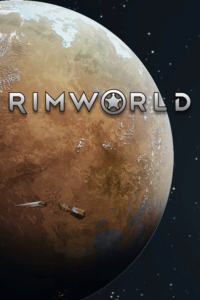 The above quote is not only a great definition. It serves as a good reminder that gaming is about the experience the player has. We all play for different reasons: Some of us want to escape our current world, some of us just want to release some stress by killing zombies, some of us want to compete for glory in a fictional or real-world arena. All of these things lead us to seek experiences that games can provide.
The above quote is not only a great definition. It serves as a good reminder that gaming is about the experience the player has. We all play for different reasons: Some of us want to escape our current world, some of us just want to release some stress by killing zombies, some of us want to compete for glory in a fictional or real-world arena. All of these things lead us to seek experiences that games can provide.
This review will be a bit different, focusing on the story of the game’s evolution, its unique premise that is an amalgamation of inspirations ranging from Firefly to Warhammer 40k, and its overall benefit as being more of a customizable story generator than a standard game.
The experiences found in Rimworld are varied, designed to be customizable, and even better, are thought up by someone who literally wrote a book on Game Design (shown above). Tynan Sylvester is one of my favorite people in the gaming industry for this fact. His journey in creating this game has been long and arduous. When did it all start?
The Start
Initially worked on in the late months of 2013, pre-alpha builds were leaked to Kickstarter backers. This was followed by a public release in 2014 that was labeled 0.1.334. This humble beginning was seen to be something of a sibling to a game somewhat similar in mechanics, Dwarf Fortress. Dwarf Fortress is similarly famous for its storytelling but more infamous for its incredibly steep and unforgiving learning curve.
Despite this similarity, they are two different flavors, with Rimworld being the Western Sci-Fi (think Firefly) cousin to Dwarf Fortress’ rugged Fantasy feel. Some who read this might be quick to point out that Dwarf Fortress has many mods available that bring it more up to Rimworld’s level. Still, I think that Tynan has a better handle on the formula for making it a truly fun and engaging experience.
It was around version 0.6.532 that I began playing Rimworld and I was immediately taken with it. It was quite rough at the time while still being engaging and, in my opinion, an amazing proof of concept. The team at Ludeon Studios worked diligently to crank out version after version, steadily progressing to 1.0. However, this took longer than you might expect while still cultivating a vast player-base.
The Journey
Deservingly, even before the official 1.0 release, Rimworld won 2016’s Indie Game of the Year at IndieDB by player vote. It would be a hard path for the Development team as they trudged forward to the official release, but again their toiling paid off when Rimworld won it’s second big award as Steam’s Top User-Rated Game of the Year in 2018. While not an official award, it is certainly an accomplishment worth recognizing. It wasn’t even a year later that the game was also nominated for the D.I.C.E awards in the “Strategy/Simulation Game of the Year” category. Despite not winning, they trucked on and released their first DLC, Rimworld: Royalty.
Seeing a game evolve as you play it over the years is something exciting to be a part of. I loved it so much that I gave a copy to a friend and talked it up to anyone who needed a game recommendation. I joined the forum for Ludeon Studios and even wrote fiction based on the universe they created. For some time, even my Twitch Channel (currently on hiatus) was dedicated to Rimworld. The ratings that you can find currently are impressive. 97% of reviews on Google are positive, Metacritic has it rated at 87 on the critic side with users rating it an overall 8.9.
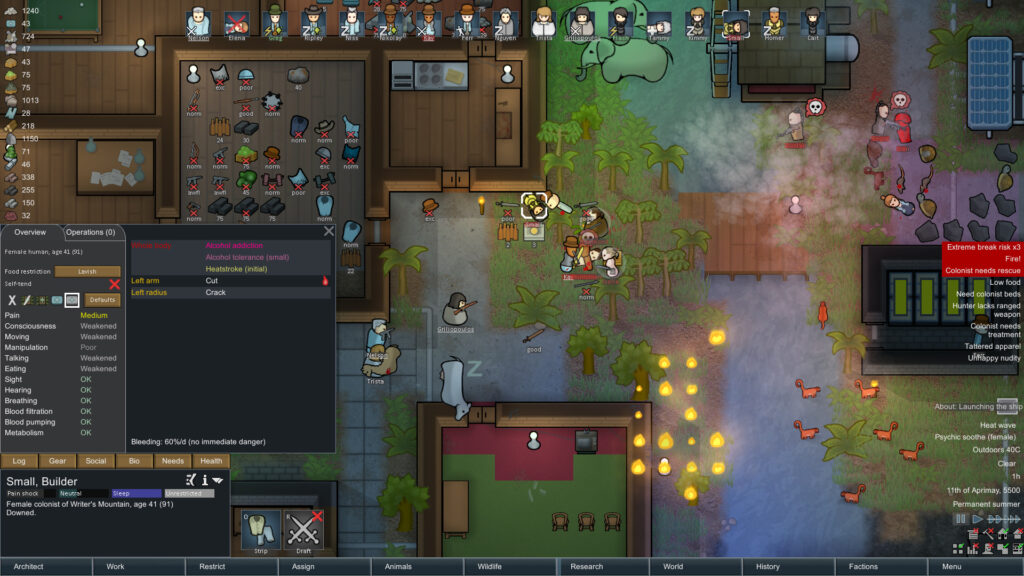
As you can see, this colony, while established, seems to be struggling during a raid. You can see wounds, injuries, and other factors affecting health on the left, accompanied by a combat log in the ‘Log’ tab that records every action in every battle.
The Criticisms
Critics haven’t been too harsh towards the game, but it does have complaints somewhat similar to what you might hear about Dwarf Fortress: “It’s too complicated” or “I can’t figure out the menus” or “These graphics are sub-par”. While fair (albeit subjective), these are complaints more appropriate for a more mainstream title, while Indie titles typically have more niche player-bases.
This is preferable, in my opinion, due to the nature of games as an art form. Developers who create for the love of the medium don’t focus on profit, they focus on the experience, they agonize over hard decisions and make difficult calls about mechanics, percentages, bugs, and more.
“Some imagine game development as a path that we follow toward our
destination. I disagree with this image. I think it’s more like a dark forest
full of stinging monsters, waiting to inject you with anesthetic poison.
Each time you bump into one, it stings you and the poison makes you
feel warm and content. But under the surface, the stings are stealing your
vigor, dissolving you from the inside. It’s only later, as your strength runs
low and the moon clouds over, that you might realize that the pleasant
feeling you’ve enjoyed all this time wasn’t progress. It was death.”
— Tynan Sylvester, Designing Games: A Guide to Engineering Experiences
For larger companies seeking a wider audience, the focus on profit typically leads to more clear-cut answers that make their decisions easier. I’m not here to focus on this disparity between indie game developers and bigger studios, but it is worth mentioning briefly. Overall, Rimworld has a focus on the player’s right to customize and tailor their game experience to their own tastes.
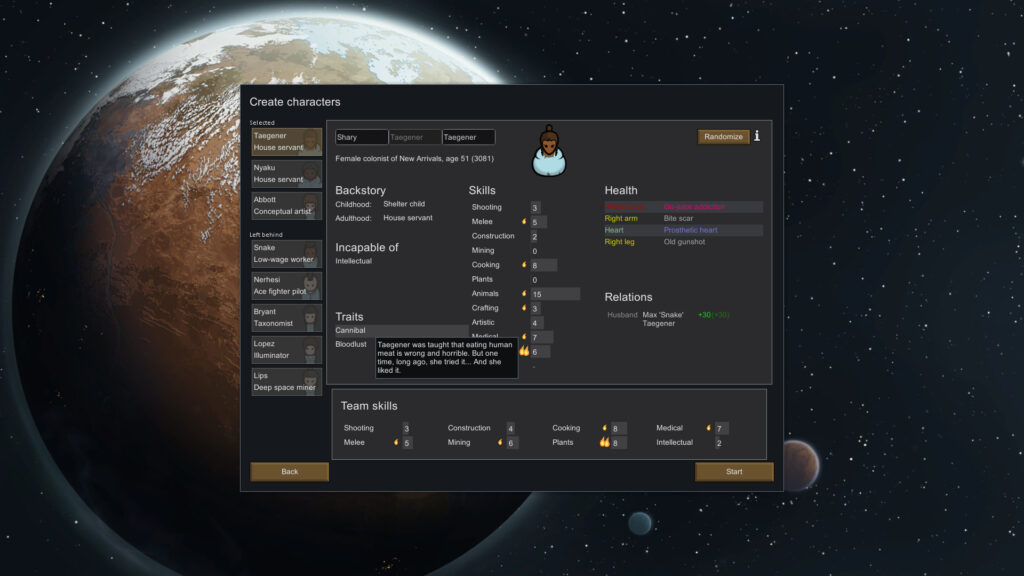
Character Creation is not so much creation as it is drafting. There is a mod to customize each character you pick before you begin, but you rely on the ‘random’ button in vanilla to get a team you’re happy with.
The Storytelling
RimWorld is not designed as a competitive strategy game, but as a story generator. It’s not about winning and losing – it’s about the drama, tragedy, and comedy that goes on in your colony.
— rimworldgame.com
The main mechanic for story progression is handled by a selection of 3 different “storytellers” you can choose from. These AI, inspired by the AI Director from Left 4 Dead, are customizable further by selecting a difficulty setting, while each has a different style. Cassandra Classic, for instance, is the classic storyteller that increases the difficulty as you go. Phoebe Chillax offers more of a relaxed, building-oriented story that allows you to focus more on managing your colony. Randy Random, as the name implies, is more chaotic, unpredictable, and perhaps the most unforgiving.
I’ve always been fascinated by this mechanic particularly. There are several mods that add more storytellers, typically for modded factions and events to be integrated, but the vanilla game is already so customizable at this point that I don’t find many mods necessary. That said, Tynan and his team decided long ago that they would work with the modding community, giving modders ample notice and information related to updates, what changes would need to be made, and much more.
Every single playthrough, even if you choose all the same settings, will be vastly different. This is partially due to world generation. Every world has different factions, with wildly different characters that you interact with using your own motley crew of survivors. Some starting scenarios, also customizable and downloadable through the Steam Workshop, are far more difficult than others. One of my favorites is the classic scenario which describes a passenger shuttle crashing, leaving 3 unwilling colonists stranded on a rim world, forced to work together to survive and eventually leave the planet by finding or building a ship (the player’s end goal).
Another scenario has you controlling a tribe searching for a new home, while another has just one rich bored person who wants some excitement and challenge in their life. The most brutal of these is a start where you control one naked, unequipped colonist who simply went in for a routine medical procedure to awake on an unknown world. As you can imagine, the latter scenario is popular for gamers who really want to test their mettle and show their skills for survival.
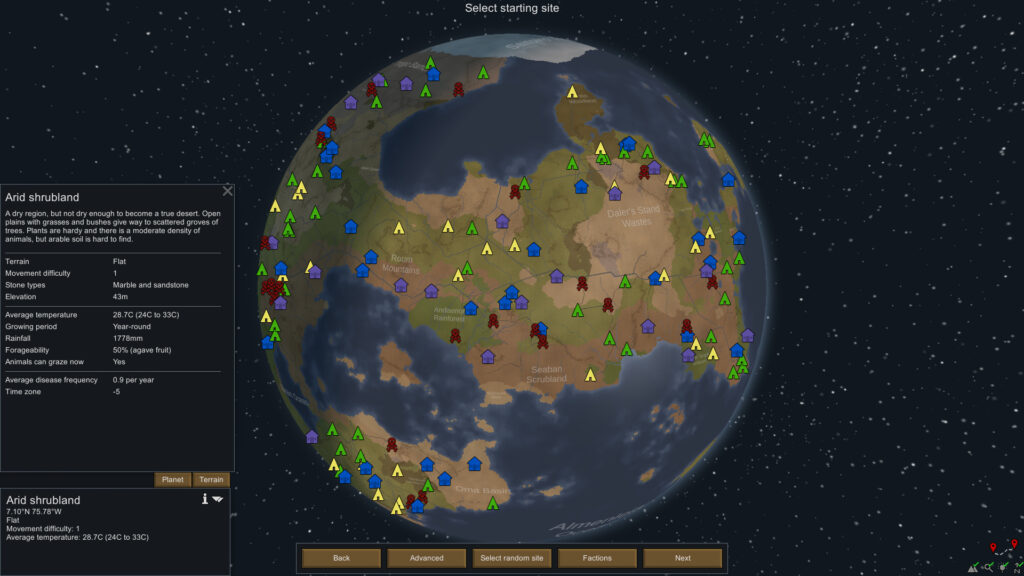
A new world is generated for each new colony that you create. Trust me when I say that you will be doing a lot of this while you learn the ropes!
Social and Psychological Factors
“Immersion occurs when the player’s experience mirrors the character’s experience.”
― Designing Games: A Guide to Engineering Experiences
Events are not limited to disasters, diseases, and raids. Other events include colonist mental breaks, social fights, colonists falling in and out of love and marrying or breaking up, and much more! Each colonist has their own backstory complete with traits, past titles, jobs, tasks they are good and bad at, etc. These all play a factor in how they interact with and perceive their environment. For instance, some colonists find themselves jealous if another colonist has a better room than they do. Others prefer to live in ascetic simplicity. Some are appalled by the very idea of cannibalism (even when starving) while some have the cannibal trait and enjoy it.
This all becomes relatable, causing the player to be drawn into the story and feel emotional bleed between themselves and the character/s. I can’t tell you how many times I’ve felt real fear when faced with an event that is likely to wipe out my colony; or felt sad and upset when a colonist I worked especially hard on is kidnapped due to a fluke.
The AI storytellers have a hand in all of this as well. They see the events going on and act accordingly. For instance, it is a common tactic to create a maze with walls that exploits the natural pathfinding of raiders. This allows you to create a maze of traps that can almost guarantee invulnerability if done properly. That was until Sappers were added to the raid pool. Sappers, as the name implies, don’t care about that pathfinding, instead heading for the nearest entrance into your base and tunneling straight through.
That’s what makes it a game of strategy as well as a simulation of a colony trying to survive the unknown.
Conclusion
I could go on for thousands of words about my love for Rimworld and its impressive mechanics, but it is abundantly clear that I have a deep love for this game. It is something I find myself coming back to year after year and has absolutely earned a permanent place in my top 10 games of all time. So, is it worth buying?
YES. 100% yes. Years ago, I might not have given this game a perfect score. However, I’ve been playing it for about 6 years, and in that time I’ve been blown away again and again by each new update and feature that draws me back in. Today, I’m happy to say that this game has earned a solid:
10/10!
Absolutely support this developer. I even recommend the expansion! For the price of the base game and the expansion, you’re still spending less than a AAA title, and in my opinion you’re getting so much more than most of those bigger games can offer. Do yourself a favor and watch some gameplay if you’re doubtful, but trust me when I say that this game deserves its stellar reputation.
Thanks for reading, and good luck! You’re gonna need it!
